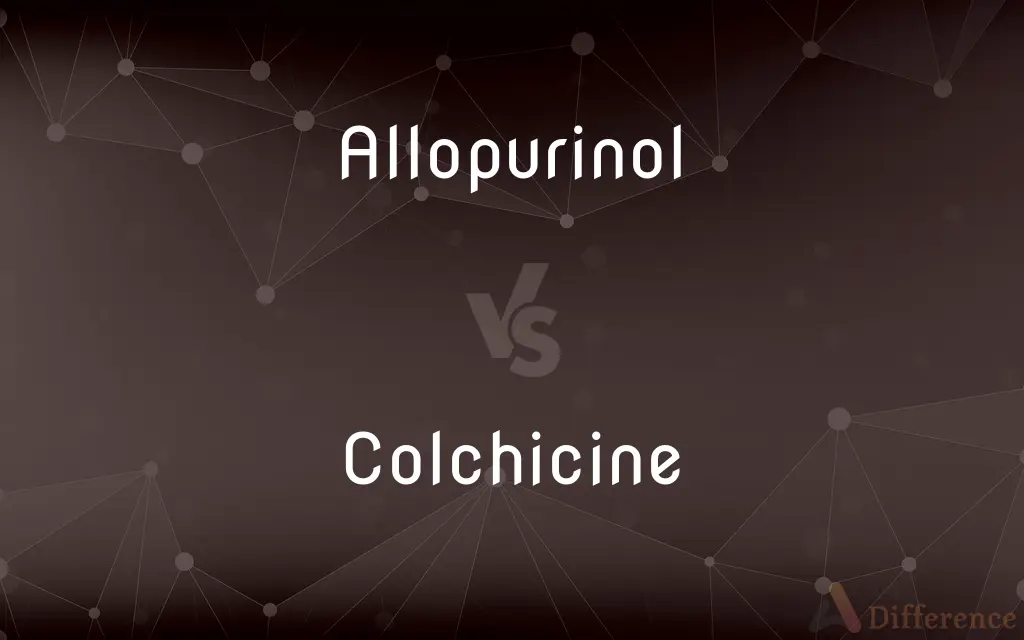Allopurinol vs. Colchicine — What's the Difference?
By Tayyaba Rehman — Published on November 28, 2023
Both are medications primarily used to manage gout, with Allopurinol reducing uric acid production and Colchicine decreasing inflammation caused by uric acid crystals. Allopurinol is used for long-term management, Colchicine is for acute gout attacks.

Difference Between Allopurinol and Colchicine
Table of Contents
ADVERTISEMENT
Key Differences
Allopurinol operates as a xanthine oxidase inhibitor, meaning it curtails the synthesis of uric acid within the body and is generally employed as a long-term strategy to manage gout and prevent future attacks. Colchicine, conversely, doesn’t influence uric acid production but rather targets the inflammatory response triggered by uric acid crystals, commonly utilized to manage acute flares of gout and sometimes as a prophylactic during the initiation of urate-lowering therapy.
While Allopurinol is known to mitigate the formation of uric acid, helping to deter the precipitation of urate crystals in joints, it doesn't provide rapid relief during an acute gout flare. Colchicine, on the other hand, while effective in providing swift relief during an acute gout episode by diminishing inflammation, does not affect uric acid levels or prevent the formation of new urate crystals.
The administration of Allopurinol is typically oral and it’s used regularly as a prophylactic to lower uric acid levels and prevent gout flare-ups. Colchicine, on the flip side, can also be administered orally, often in higher doses during a gout attack to quickly ameliorate pain and inflammation and in lower doses when used prophylactically.
It’s worth noting that Allopurinol is often recommended for patients with frequent gout attacks, tophi, kidney stones, or other signs of progressing gout disease due to its ability to lower uric acid levels. Colchicine, while sometimes used regularly to prevent attacks, is more famed for its ability to swiftly manage the inflammation and pain associated with acute gout episodes.
Side effects form another differentiating point; Allopurinol may cause rash, kidney problems, or exacerbate gout when treatment is initiated. Colchicine can induce gastrointestinal issues such as diarrhea or nausea, especially when used in higher doses to treat an acute gout attack, and may have toxic effects when used in excess or in patients with impaired kidney function.
ADVERTISEMENT
Comparison Chart
Primary Action
Reduces uric acid production
Decreases inflammation
Usage Timing
Long-term management
Acute attacks and prophylaxis
Effect on Uric Acid Levels
Decreases levels
No direct effect
Administration
Typically oral
Oral, sometimes intravenous
Common Side Effects
Rash, increased gout attacks initially
Diarrhea, nausea
Compare with Definitions
Allopurinol
Can prevent urate crystal formation.
The doctor suggested Allopurinol to prevent the formation of further urate crystals in his joints.
Colchicine
Often used during acute gout attacks.
When his gout flared up, he took Colchicine for quick relief.
Allopurinol
Utilized for long-term gout management.
He takes Allopurinol daily to prevent future gout attacks.
Colchicine
Can be used prophylactically for gout.
She takes a low dose of Colchicine daily to prevent gout attacks.
Allopurinol
A xanthine oxidase inhibitor.
Allopurinol is prescribed to reduce the production of uric acid in gout patients.
Colchicine
Known for gastrointestinal side effects.
After taking Colchicine, he experienced some diarrhea.
Allopurinol
Might exacerbate gout when initially administered.
Her gout attacks increased slightly when she first started Allopurinol.
Colchicine
A medication reducing inflammation in gout.
Colchicine alleviated his gout flare by reducing inflammation rapidly.
Allopurinol
May lead to side effects like a rash.
After starting Allopurinol, he experienced a mild, itchy rash.
Colchicine
Does not lower uric acid levels.
Unlike Allopurinol, Colchicine does not influence uric acid levels.
Allopurinol
A drug, C5H4N4O, that inhibits uric acid formation in the body and is used to treat conditions, especially gout, that cause elevated uric acid levels.
Colchicine
A poisonous alkaloid, C22H25NO6, that is obtained from the autumn crocus and inhibits microtubule formation. It is used in medicine to treat gout and in plant breeding to produce polyploid plants.
Allopurinol
(pharmaceutical drug) A synthetic drug which inhibits uric acid formation, used to treat gout and related conditions.
Colchicine
A highly toxic alkaloid, chemical formula C22H25NO6, originally extracted from plants of the genus Colchicum and formerly used to treat rheumatic complaints, now used mainly in the treatment of gout.
Allopurinol
A drug (trade name Zyloprim) used to treat gout and other conditions in which there is an excessive buildup of uric acid
Colchicine
A powerful vegetable alkaloid, C17H19NO5, extracted from the Colchicum autumnale, or meadow saffron, as a white or yellowish amorphous powder, with a harsh, bitter taste; - called also colchicia.
Common Curiosities
Does Allopurinol provide immediate relief in gout?
No, Allopurinol is for long-term management and doesn’t provide immediate relief.
Is Allopurinol used during acute gout attacks?
Typically, Allopurinol is not used for immediate relief during acute attacks.
Can Colchicine lower uric acid levels?
No, Colchicine does not lower uric acid levels but reduces inflammation.
How quickly does Colchicine act in gout attacks?
Colchicine can provide relief within 12-24 hours in acute gout.
What are the common side effects of Colchicine?
Colchicine may cause gastrointestinal issues like diarrhea and nausea.
Can Allopurinol cause an initial increase in gout attacks?
Yes, Allopurinol can trigger more gout attacks initially.
Is Colchicine used in other conditions?
Yes, Colchicine is also used in conditions like familial Mediterranean fever.
Should Allopurinol be taken daily?
Yes, Allopurinol is usually taken daily for chronic management of gout.
Is Colchicine safe for all patients?
Colchicine may need caution or adjustment in kidney dysfunction.
Can Allopurinol cure gout?
Allopurinol doesn’t cure but manages gout by lowering uric acid.
Is Allopurinol beneficial for kidney stones?
Allopurinol can prevent urate kidney stones by reducing uric acid.
Can Colchicine and Allopurinol be taken together?
Yes, they can be combined, often for different phases of gout management.
How is Colchicine administered?
Colchicine is usually administered orally, sometimes intravenously.
How does Allopurinol affect kidneys?
Allopurinol may have varying effects and requires monitoring in kidney disease.
Who should avoid Allopurinol?
Individuals allergic to Allopurinol or with certain conditions may need alternatives.
Share Your Discovery

Previous Comparison
Liquid Ammonia vs. Liquor Ammonia
Next Comparison
Relieving Letter vs. Experience LetterAuthor Spotlight
Written by
Tayyaba RehmanTayyaba Rehman is a distinguished writer, currently serving as a primary contributor to askdifference.com. As a researcher in semantics and etymology, Tayyaba's passion for the complexity of languages and their distinctions has found a perfect home on the platform. Tayyaba delves into the intricacies of language, distinguishing between commonly confused words and phrases, thereby providing clarity for readers worldwide.












































